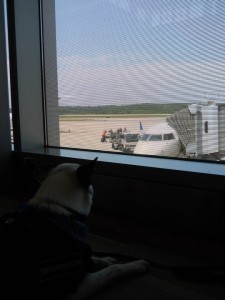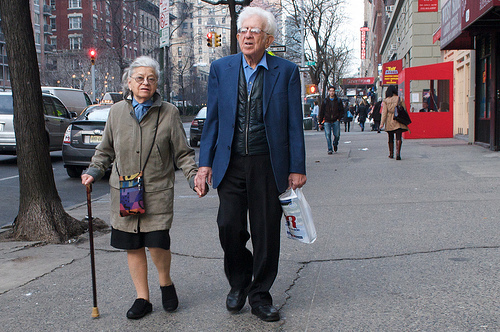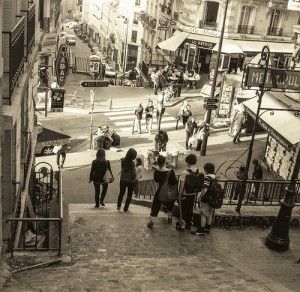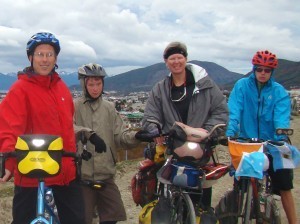Rolf Potts's Blog, page 77
November 1, 2012
The Banana Pancake Syndrome: watch your steps
Vagablogging :: Rolf Potts Vagabonding Blog
 Some twenty odd years ago, Ian Mckaye – at the time the angry singer of straight edge punk pioneers Minor Threat – sung “guilty of being white”. The lines of the aggressive chorus blazed into my mind as I stepped at the airport’s immigration line to re-enter Malaysia; a bunch of what seemed young Australians were waiting behind me. They were dressed and attired in the quintessential banana pancake trail non-outfit: singlets, flip-flops, short pants. The picture was stereotypically completed by over exposed tattoos – even the shabbiest ones -, visibly dirty long hair, and the red cheeks which are typical of an in-flight heavy boozing session. They were exchanging idiotic comments on the situation in their slurred, drunken Aussie lingo.
Some twenty odd years ago, Ian Mckaye – at the time the angry singer of straight edge punk pioneers Minor Threat – sung “guilty of being white”. The lines of the aggressive chorus blazed into my mind as I stepped at the airport’s immigration line to re-enter Malaysia; a bunch of what seemed young Australians were waiting behind me. They were dressed and attired in the quintessential banana pancake trail non-outfit: singlets, flip-flops, short pants. The picture was stereotypically completed by over exposed tattoos – even the shabbiest ones -, visibly dirty long hair, and the red cheeks which are typical of an in-flight heavy boozing session. They were exchanging idiotic comments on the situation in their slurred, drunken Aussie lingo.
As I tried to forget them and walked to the officer getting my papers in order and surpassing the passport check stations, here I see another white trash queen: she is about 20 years old, trashing her thongs around, wearing the shortest mini hot pants you may imagine in order to expose her tighs, emblazoned with one of those silly female-skull-with-butterfly-wings tats you can get at every cornershop. I instantly turn around to check if the beach is in sight, but the only thing I can score is the luggage carousel, slowly spitting bags out of his noisy esophagus. Luckily, no other passenger around me suffered from the banana pancake syndrome.
It may be the coming of age, or it may be the fact I have been used to travel in Islamic nations where such a behavior would result in an instant flash mob or a brutal gang rape, but I think that by carrying the symptoms of Western casual stupidity and holiday retardedness, these youth are reconfirming to Southeast Asian people that inventing ways to empty their wallets is approved by every God. Mohamed included.
I feel offended by the low profile of such people: Southeast Asia is not a fool’s playground, for chrissakes. If humanity has a decency level which is measured in the ways we act, I candidate the backpacker type as some of the ugliest, gone wrongest experiments. Please people, react and do something. Asia is not your playground, and when your flabby beergut stinks, let me tell you, it really does.
Original article can be found here: The Banana Pancake Syndrome: watch your steps
October 31, 2012
Flying domestically (usa) with a service dog
Vagablogging :: Rolf Potts Vagabonding Blog
Flying with your Service Dog takes a bit of pre-planning. Most airlines require 48 hours advance notice about your canine partner. Initially tickets can be booked online through a collective search website like CheapOair. Before purchasing tickets, check out the Airlines direct website for Service Animal rules. Under Federal Law airlines are required to allow Service Animals but a few are friendlier about it than others.

For example: Delta Airlines states on their Special Concerns page “We welcome trained service animals in the aircraft cabin. Trained service animals are different from emotional support animals in that they have been trained to perform a particular function or service to assist a passenger with a disability in the management of their disability. Under most circumstances, we do not require passengers using trained service animals to provide additional documentation. However, it is expected that a service animal behave in public and follow the direction of its owner.”
Special note: If you have an Emotional Support or Psychiatric Service Animal you must provide documentation from your Mental Health Professional.
Before finalizing travel plans take into account if your dog will need to relieve itself during a layover. Allow yourself as much time as possible in case you’ll need to exit and re-enter a security check point.
Two days before, call into customer service and follow the extensions for an existing flight. Have your ticket conformation number handy. Let the representative know you’re traveling with a Service Dog and at this time you may request a bulkhead seat. From experience, I’ve found that the bulkhead window seat provides the most floor room for my dog to curl up. Sometimes (but not always) they’ll ask the breed and size of your animal and also what tasks it preforms for you. Any airline staff or airport personal are allowed to ask what tasks your dog preforms for you. They can NOT ask directly what your disability is. Answer them nicely. They only do this to confirm legitimate Service Dogs.
Navigating security isn’t as horrible as the media advertises. Liquid restrictions and the taking off of shoes is a pain; but it’s just part of the process. On the upside you don’t have to stand in those long, long security lines. Look for a sign that says, “Crew or Passengers needing extra assistance.” These lines are generally shorter and will help accommodate your needs. To enter, hand them your boarding pass, ID and Service Dog Handler ID. That last one isn’t required; however it helps to have one. Mine is plastic (size of a credit card) has my countries flag, the names of myself and my Service Dog as well as our photos. On the back is printed the U.S. Federal Law about ADA Act, along with phone numbers and website address for the Department of Justice. Occasionally this ID has been photocopied, along with her vet papers, when we’ve flown internationally.
Generally, I opt for the old fashion metal detectors and put my dog in a sit-stay on one side. Pass through myself, and call her through to me. Do not remove your animals harness or vest. Only their packs need to go on the belt. If possible I take extra care not to “beep”, but my dog always does. Her working harness, collar and leash all have metal buckles—no avoiding that. This does mean TSA will pat down and search your dog. I use a stand-wait command for my Service Dog. That way she can be searched without interaction with the agent. The process doesn’t take long. They feel her harness and usually swab her for explosive residue. If you need to hold your dog during the search, they’ll swab your hands too. In the event your dog is uncomfortable being handled by strangers with rubber gloves, get a thin cape with plastic buckles and a rope leash to avoid them “beeping.” Place their normal working gear in the bin with your shoes.

When at your gate; take advantage of pre-boarding. You can get yourself and your animal settled before the wave of other passengers. I take along a small blanket to place on the floor so she doesn’t leave fur behind. It’s also good practice to find out if the fellow passenger beside you likes dogs once they sit down. I’ve personally never had an issue with anyone not.
Flying international with your Service Dog requires extra paperwork and attention to detail; as well as, traveling with mobility equipment, such as a wheelchair. I’ll address that in another post.
Original article can be found here: Flying domestically (usa) with a service dog
Vagabonding Case Study: Lauren
Vagablogging :: Rolf Potts Vagabonding Blog
Lauren
Age: 29
Hometown: Walnut Creek, CA
Quote: “I was taking off to Africa with a one way ticket, telling everyone, “I could be gone 3 months or 3 years, it’s anyone’s guess.” It was a great reminder that others have done this and made it possible and I could do it too..”
How did you find out about Vagabonding, and how did you find it useful before and during the trip?
I stumbled across the website and book about a year before I took off on my trip. It was helpful during the planning stages and after I bought my ticket when I would have my moments of doubt or concerns about how I was “just traveling” vs. studying, working, or volunteering. In America, gap years aren’t typical so I felt I was doing something atypical, whom most couldn’t understand. (Then again, I was taking off to Africa with a one way ticket with no time frame, telling everyone, “ I could be gone 3 months or 3 years, it’s anyone’s guess.” It was a great reminder that others have done this and made it possible and I could do it too.
How long were you on the road? 9 months!
Where all did you go?
I went from Tanzania- Kenya- Tanzania- Malawi- Mozambique- Swaziland-South Africa. When I got burnt out after 8 months, I joined an overland tour and visited Namibia, Botswana and Zambia.
What was your job or source of travel funding for this journey?
I lived at home during and after I graduated college. I saved money for 2.5 years.
Did you work or volunteer on the road?
I had the idea, if any volunteer opportunity that resonated with me came my way, I’d volunteer. In the end, I didn’t volunteer but did visit a few orphanages and NGO’s. I also have a new outlook and opinions about volunteer tourism.
Of all the places you visited, which was your favorite?
South Africa holds a special place in my heart. For some unexplainable reason, it feels like “my second home.” My first trip to South Africa I volunteered in a women’s shelter and during weekend travels and meeting other travelers the seed was planted to return to Africa and travel East to South.
Mozambique is one of my favorites. It’s a country of contrast and full of beauty. The people are resilient and friendly, the country is gorgeous and there were many moments where I wondered if I was still in Africa. There are so many influences of the Portuguese, who colonized both Mozambique and Angola, including the language, architecture, and food. In the capital cities, there were “European style cafes” and in the smallest towns there were always women selling pao, bread on the street.
Was there a place that was your least favorite, or most disappointing, or most challenging?
The most challenging for transport would be Mozambique. Buses often left at 4am and the roads were littered with pot holes from the civil war in the 90’s.
Did any of your pre-trip worries or concerns come true? Did you run into any problems or obstacles that you hadn’t anticipated?
No. I don’t remember if I had any pre-trip concerns but in hindsight, I was scared out of my mind before embarking on my travels but I didn’t admit this to myself until after I returned home. I had to be my own advocate for what and why I was doing this trip solo, especially as a young woman.
I didn’t experience problems that may come to mind while traveling in Africa but did face a lot of attention from men who saw me as a “walking visa” or as sex. They were almost always friendly and asked the same questions in almost every country, so I came to expect them
1. What’s your name?
2. Where are you from?
3. Are you married?
Always the same order, always the same questions. I always said I was married. Sometimes I’d answer them, sometimes ignore them, sometimes give them funny answers such as “I’m from the Earth” or “guess?”
Which travel gear proved most useful? Least useful?
Most:, Camera, Headlamp, Flip flops, sarong because it’s multi-use cloth that can be used as a towel for bathing or for the beach, as a skirt, scarf, head wrap, dress etc. and Thermals, despite popular belief, it does get COLD in Africa.
Least: Mosquito net tent. I brought because I wasn’t sure what type of lodging I would find and if there would be mosquito nets. In almost every place I stayed in, there were mosquito nets hanging from the ceiling.
What are the rewards of the vagabonding lifestyle?
Being free. Free to go where I want, when I want and having everything I need on my back. I always felt empowered knowing I had everything I needed and could do without a lot of material things, were trained to believe we need.
Meeting other travelers on the road and sharing and connecting with them.
Trying new things
What are the challenges and sacrifices of the vagabonding lifestyle?
Leaving friends and family behind
Loneliness
What lessons did you learn on the road?
Often the people who seem to have the least, seem to be the happiest
I learned how resilient and curious I am, how much I can push myself and comforts, how feisty I can be and just how independent I am.
Go with the flow, let go and trust life always works out
If there was one thing you could have told yourself before the trip, what would it be?
Any advice or tips for someone hoping to embark on a similar adventure?
Just go! Don’t wait for the perfect time or opportunity because there “never is a perfect time.”
If you’re traveling in Africa, there may not be as many travelers who are crazy/brave enough to travel in Africa but you will meet people.
Prepare to hand wash your clothes
When and where do you think you’ll take your next long-term journey?
I just returned from a year teaching in the South of Spain. I may be returning for another year this time in the North.
As for another vaga-bonding journey, I would love to travel in South America. I’m just not sure when-maybe in a year or two?
Website: roamingtheworld.wordpress.com
Are you a Vagabonding reader planning, in the middle of, or returning from a journey? Would you like your travel blog or website to be featured on Vagabonding Case Studies? If so, drop us a line at casestudies@vagabonding.net and tell us a little about yourself.
Original article can be found here: Vagabonding Case Study: Lauren
October 29, 2012
Children don’t need your presents, they need your presence
Vagablogging :: Rolf Potts Vagabonding Blog
They say the best gift parents can give their children is their time. I so totally agree.
What would it take for you to spend more time with your child?
If your son was suddenly diagnosed with a serious illness and most likely wouldn’t live more than few weeks, would you endeavor to spend every moment with him?
If a serious accident befell your daughter, would you find a way to be with her?
I suspect the answer in both scenarios would be a rousing YES! Of course we would spend every moment with our children if we knew we didn’t have much time with them.
But do we know we WILL have time? It’s so easy to take time for granted and assume our children will be there at some point off in the distant future when we decide we have time for them. But now? Now we’re busy with work and all the other things that somehow manage to fill our days.
And someday, when we’re old and gray and sitting in our rocker, we’ll look back upon all the planes we caught and dollars we stashed in the bank and we’ll wonder how it happened that our children grew old without us.
A few years ago I visited a friend whose son had recently committed suicide. As I knocked on her door I wasn’t sure what words of wisdom I could possibly say. In the end, she was the one with words of wisdom for me.
My friend gave me the biggest hug I’d ever had and, as tears streamed down her cheeks, she said, “Take advantage of every moment. Spend every minute you can with your precious children. Don’t put it off. Tomorrow may never come.”
I thought about Lisa’s words for many an hour as I cycled the highways and byways of the Americas with my husband and children. My sons were changing fast, and I was right there with them.
I won’t be old and gray, sitting in my rocker with bucketloads of money sitting in the bank thinking back upon my life thinking, “I wish I woulda…” Instead I’ll be sitting in that rocker knowing I’m richer, by far, than all those with fat bank accounts. Richer in memories.
Isn’t that what life is all about?
Children don’t need your presents, they need your presence.
Nancy Sathre-Vogel is the “Mom” to Family On Bikes. Family On Bikes is just your everyday, American family who happens to be following their dreams and chasing rainbows. They are adventure-seekers and modern-day explorers who are limited only by their imaginations—and they have very vivid imaginations! They learned early to grab life by the horns and live it to the fullest—to, literally and figuratively, enjoy the ride. The Vogel Family’s most recent adventure was cycling 17,300 miles from Alaska to Argentina.
Original article can be found here: Children don’t need your presents, they need your presence
Retirement, vagabonding style
Vagablogging :: Rolf Potts Vagabonding Blog

A couple, strolling in New York. Photo: Ed Yourdon / Flickr
The Wall Street Journal had a story titled, “The let’s sell our house and see the world retirement.” A couple, Lynn and Tim Martin, decided to ditch the stereotypical retirement lifestyle and hit the road.
Here’s how Lynn describes it:
In short, we’re senior gypsies. In early 2011 we sold our house in California and moved the few objects we wanted to keep into a 10-by-15-foot storage unit. Since then, we have lived in furnished apartments and houses in Mexico, Argentina, Florida, Turkey, France, Italy and England. In the next couple of months, we will live in Ireland and Morocco before returning briefly to the U.S. for the holidays.
Nice to read that anyone can be a vagabonder, regardless of age, gender, income level, etc. Where there’s a will, there’s a way.
Just under the headline, click on “Interactive Graphics” to see a map with a breakdown of the Martins’ budget. Most of cities they’ve lived in turned out to be cheaper than their California home, even expensive destinations like London. Lynn gives much of the credit to the vagabonding ethic, as she shares here:
We follow some simple strategies to keep our budget in line. Stays in more expensive locations, like Paris or London, are balanced by living in less pricey countries like Mexico, Turkey or Portugal. We dine out several times a week but eat at home much of the time. I like to cook, and food shopping is a great way to learn about a country. (Finding baking soda in Buenos Aires isn’t nearly as simple as it sounds.)
Have you retired and are currently traveling? Please share your experiences in the comments.
Original article can be found here: Retirement, vagabonding style
October 28, 2012
Travel, by its very nature, is a ritual act of renewal
Vagablogging :: Rolf Potts Vagabonding Blog
“The structure of tourism is basically identical to that of all ritual behavior: it first translates the tourist into a sacred world, then transforms/renews him, and finally returns him to normality. This other world is sacred because it is out of space and out of time. The normal rules are in abeyance (if not actually reversed), and replaced by [a] close and egalitarian ‘communitas.’ It is evident to the tourist that this exalted state is too good to last, however, and he is returned to normality renewed in his acceptance of it. What he has experienced, then, is a classic rite of renewal.”
–David Brown, from The Tourist Image: Myths and Myth Making in Tourism (1996)
(1996)
Original article can be found here: Travel, by its very nature, is a ritual act of renewal
October 26, 2012
Vagabonding Field Report: Experiencing the luck of the Irish
Vagablogging :: Rolf Potts Vagabonding Blog
Cost/day: $40/day
What’s the strangest thing you’ve seen lately?
With a pint of Guinness in hand, I listened to an old, Irish man play his guitar and sing folk songs about Ireland’s beautiful country side, fight for independence and love of drinking while the entire bar sang along. It is rare – and strange – that prior perception and reality are aligned when traveling, but this scene was exactly how I had pictured Ireland in my mind.
Describe a typical day:
Take a stroll through Trinity College’s campus, one of the oldest and most beautiful universities in the world. Get rained on. See St. Patrick’s Cathedral. Go to the National Museum and learn all about Ireland’s exciting history. Go to the Guiness distillery. Get rained on, again. End the night at a pub in the Temple Bar district.
Describe an interesting conversation you had with a local:
I met an old man from Belfast who told me stories about what it was like when the terrorist attacks were at its peak. He said that one night he was at a restaurant and he saw a suspicious man leave a bag and walk out. He knew what it probably was and thought, “well I can either die in the restaurant or die in the street, makes no difference to me.” So he grabbed the bag, ran into the street and threw it as far as he could. He lived and so did everyone in the restaurant. I have no way of knowing if this was a true story, but hearing this old man tell me the story through his thick Irish accent was entertaining none the less.
What do you like about where you are? Dislike?
I liked the Irish character. They are undergoing a huge economic crisis, yet it didn’t seem to impact them much. Perhaps the Irish are simply too used to hardship, or too stubborn, to let it interfere with their daily life. They have a knack for letting life go on and even embracing their troubles – giving each person a better story to tell and greater respect for having endured the suffering.
I disliked the weather. It never stopped raining!
Describe a challenge you faced:
There were no challenges – it was a very smooth and pleasant trip! Boring answer, I know.
What new lesson did you learn?
There are lots of good flight connections through Dublin. If you are traveling anywhere through Europe, you can easily have your flight route through Dublin and have a layover for several days. It is well worth it!
Where next?
Moscow, Russia (if the visa ever goes through) and Belgrade, Serbia. You can follow me at http://worldventureproject.com or https://twitter.com/WorldVentureP
Original article can be found here: Vagabonding Field Report: Experiencing the luck of the Irish
October 25, 2012
When going back home, take it as a holiday
Vagablogging :: Rolf Potts Vagabonding Blog

picture credit: Flickr/ Metrix X
The only way to survive a 10 months post travel blues was fairly simple to me: I took it as a holiday.
Seriously. You may not have seen your folks and friends for several years, but this should not be a reason to freak out. The same goes for your friends; because pretty much, nothing has changed substantially. Except, possibly, yourself.
Yourself and not much else. You will see your town/city still busy with those same old deeds… the smell will be the same. Your place, luckily, will not have changed that much too. Most certainly, it won’t. And when we get to realize that the only person who actually made a pro -or a re- gress is just ourselves, relaxing and letting it flow past slowly, savoring it as a vacation from our own travelling, really feels good.
So, what are some of the things you may do to make it look like a real holiday?
Take it easy
And this has to be stressed completely: you are back home, the travel burden is over. Just kick back, grab that book you turned down for the past three weeks for a guidebook, turn on some nice music, and just do what you should at home: relax, unwind.
Catch up with old friends
As much as you are curious to know what happened while you were away, most of your friends will be extremely happy to hear some of your travel stories. And this does feel good, and can turn boring afternoons or evenings into mundane events. Accept that coffee invitation, make some phone calls, post on your Facebook wall that you are back and willing to see your old pals. You will get some positive vibes, making your stay at home even more of a nice holiday J
Organize a return dinner
This may sound biased and simple, but there are fewer other occasions than dinners to really get together and catch up with people. And talk. And gossip! If you have the energy to cook a simple past dish and invite 5 or 6 friends over, you will save a bunch of time and will have a very good one, indeed.
Your parents are there, too
And they probably have been waiting for you more than anybody else, following your trip on a world map they would check each time they got an e-mail from YOU, the travelling son/daughter in a distant, unknown, far away land. Parents are great and can help ease your transition from the travel world to the real one… and if you live with them or need to be with them for a while as you look for a new place, exploit this time together to do anything you feel would make them happy.
Organize a slideshow of your pictures and lecture your friends about your trip. You will not only enjoy some good moments of attention, but you may become the inspiration for some to actually get out and do what you have done successfully. Sometimes, this is all what it takes to encourage others to take life changing decisions… and if you feel as great and empowered from your trip as I think you do, what a better way than help your friends improve themselves?
Do you have any experiences returning home after an extended trip? Do you have any other worthwhile suggestions to ease the transition back into the ordinary world? Please comment below.
Original article can be found here: When going back home, take it as a holiday
October 24, 2012
Have you encountered ghosts?
Vagablogging :: Rolf Potts Vagabonding Blog
A week from now is All Hallows Eve “vigil of All saints” or commonly known in North America as Halloween. The holiday’s roots are of pagan Celtic origin; but it seems to be spreading around the world in modern fashion. When I was young, it meant dressing up in a costume and walking around my small town neighborhood, knocking on doors and gathering more candy than I’d ever eat. On October 31st my three year-old-niece will dress up as a frog fairy princess (her creative idea) and I’ll take her to go trick-or-treating.
But today’s celebration barely resembles the original festival known as Samhain. It was the eve before the official start of winter for the Celtics. It was a huge transition; cattle and sheep were brought in to closer pastures, crops were harvested and stored. Pagans also believed the cloak between this world and the other was thin on that night. Therefore ghosts of the dead could walk freely among the living and all the souls who died that year would pass into the otherworld.

Flicker/creative commons: hugovk
Reminisce of this holidays roots linger today. But what about the belief that ghosts walk among the living…
Are you in a county that observes Halloween?
Have you ever encountered ghosts during your travels?
Please share your stories…
Original article can be found here: Have you encountered ghosts?
October 22, 2012
Why family travel is good for kids and good for parents
Vagablogging :: Rolf Potts Vagabonding Blog
 I’ve heard it all. Some people feel travel is the best experience kids can have. Others feel kids are better off staying home and going to school each day. I say there’s good on both sides of the equation.
I’ve heard it all. Some people feel travel is the best experience kids can have. Others feel kids are better off staying home and going to school each day. I say there’s good on both sides of the equation.
There is benefit in giving kids a stable home where they can sleep in the same bed every night. There is also benefit in taking kids out traveling.
In the end travel with kids is good for both kids and for parents.
Travel is good for kids because:
Travel gets kids out of their comfortable routine and opens their eyes to the idea that others live differently than they do. As they visit other cultures and eat different foods, they start to realize the interconnectness of our world. They step outside their ethnocentric mindset and realize the world doesn’t revolve around them.
Being global citizens in today’s society is critical. In a world that’s shrinking daily, understanding other cultures is a huge advantage.
While traveling, kids learn in context. Rather than reading random facts and figures from a book, they are living, touching, breathing new experiences which makes their learning more effective.
While traveling, kids are exposed to many new ideas and may discover new interests or expand on interests they already have.
Because they are placed in so many unique situations while traveling, kids learn to be flexible and to adapt to whatever comes their way.
Travel is good for parents because:
In today’s workaday world, we rarely get to spend more than a few fleeting moments with our children. While traveling, we parents get the opportunity to be with them all day. It takes time to forge a relationship, and travel can provide that time.
Traveling with kids opens new doors that you would never even know existed if you traveled without them. You’ll meet more people and be invited to events that otherwise would remain off limits to adult travelers.
Kids force us to stop and smell the roses. Whereas we might be tempted to see the sites and breakneck speed on our own, that pace doesn’t make sense with kids. You’ll see less, but see it better.
Travel with kids is just plain ol’ fun.
Can all of these things be accomplished other ways? You bet. Is travel essential to have time together as a family and to create global citizens? Absolutely not.
But traveling together is perhaps, the easiest way, and there’s no doubt it’s a lot of fun.
Nancy Sathre-Vogel, more commonly known as Mom to Family on Bikes (www.familyonbikes.org), is a long-time traveler. She’s gallivanted around our planet for the past 29 years, the past fourteen with her twin sons. Her most recent excursion was a three-year journey on bicycles from Alaska to Argentina. Now her mission is to encourage others to live their dream – wherever it leads!
Original article can be found here: Why family travel is good for kids and good for parents
Rolf Potts's Blog
- Rolf Potts's profile
- 323 followers



















